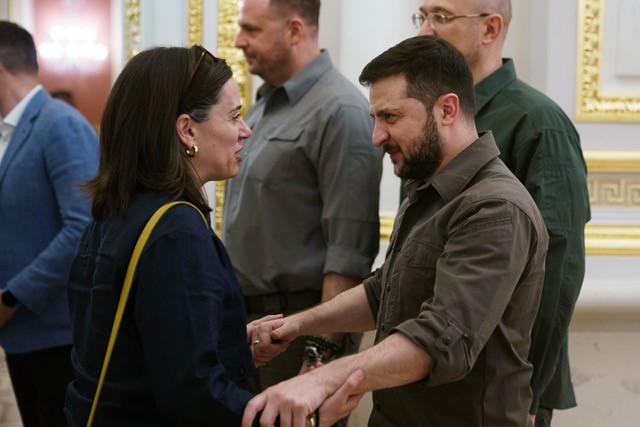
Larisa Galadza ’94: War Zone Ambassador
Larisa Galadza ’94 was Canada’s Ambassador to Ukraine from 2019-2023. She is the first Canadian ambassador to serve in an active war zone since the Second World War. Following the completion of her post in Ukraine in August, she reflected on her life-changing experiences and shared some memories of her time at Trinity.
“To watch President Zelenskyy conduct international relations and remember very clearly some of those lessons from my second year at Trinity with Janice Stein was fascinating. To have sat across the table from him in the Office of the President, to have walked those halls, to have dealt with the Minister of Defence, the Minister of the Interior, the Prosecutor General—it’s all very personal. And I think it has changed me in ways I won’t understand for a while.”
–Larisa Galadza, August 2023
Choosing Trinity
Larisa Galadza hadn’t heard of Trinity College before she visited as a girl. But once she did, she knew it would become part of her future.
“My dad was a priest,” Galadza explains. “He used to bring me along to various events. One Sunday night—I think I was in middle school—we went to an ecumenical service in the Trinity College Chapel. I was awestruck by the Chapel, and then I saw all the men and women of college rushing off to high table dinner in their gowns. I thought, ‘What is this place?’ And I decided, ‘I’m going to go to university here. Whatever it is that they’re doing, it’s something I want to be part of.’ ”
Galadza became the first in her family to attend Trinity, followed later by her sister Sofia Galadza ’00 and her cousin Daniel Galadza ’05. She studied Political Science, and Ethics, Society and Law.
College ties
Raised in Brampton, Ontario, Galadza was a cantor at her dad (Father Roman Galadza)’s parish, St. Elias the Prophet Ukrainian Greek Catholic Church. While at Trinity, Galadza sang in the chapel choir, including as a choral scholar for two years. She also lived in residence all four years.
“I absolutely loved it,” she smiles. “Honestly, I don’t remember a lot from my classwork. But I clearly remember so many hallway conversations at St. Hilda’s, just sitting on the floor or in the dining room, talking with people and expanding my world in every way.”
“Being at Trinity was wonderful because I had this smaller program with professors that we all knew and ate dinner with. And we learned from people like Janice Stein, Robert Bothwell, Wesley Wark and others, like visiting professor Christopher Andrew. They were part of the University of Toronto ecosystem that you could take advantage of, and so I had the best of both worlds.”
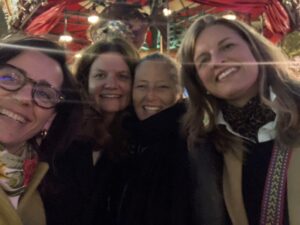
Her high school sweetheart, Kenneth Cronin ’95, who later become her husband, also studied at Trinity. The two built a wide circle of friends that she refers to as “a gift,” including Caroline Pitfield ’95, Karen Schroh ‘95, Joanna Bailey ’05, Sarah Laughton ’94, Michael Chong ’94, Carrie Davidson ’95, Judd Palmer ’95 and Sang Won Kim.
“The people who have supported me as an individual are all my Trinity friends,” says Galadza. “They were at my wedding, at my kids’ baptisms. They supported me through a difficult work posting. And now I see many of them at home in Ottawa. In fact, one of my son’s now sings in an Anglican choir with someone that I used to sing with at Trinity. All those gifts keep on giving and keep showing up in life.”
Building her career
After Trinity, Galadza completed her master’s degree in International Affairs at Carleton University before joining the Department of National Defence in 1996. She worked in policy-related positions at the Privy Council Office in 2001 and at the Treasury Board Secretariat from 2003 to 2006, before moving to Public Safety Canada, where she was director of Strategic Policy and Research and then senior director for National Security Policy. From 2012 to 2014, she served at the Privy Council Office as director of operations for the Social Affairs Committee of Cabinet, and then, from 2014 to 2016, she was director general of Admissibility at Citizenship and Immigration Canada. In 2016, she became director general of the Peace and Stabilization Operations Program at Global Affairs Canada, where she served until being posted to lead Canada’s diplomatic mission in Ukraine in 2019.
“I’m a policy wonk, not a career diplomat,” says Galadza. “Ian Shugart, who was the Clerk of the Privy Council and Deputy Minister of Foreign Affairs and is also a Trinity alum, once described policy work in the best way I’ve ever heard. He said, ‘Policy work is this: you identify that we have a problem, and then set out to answer the question, what are we going to do about it?’ My Ethics, Society and Law program at Trinity was very much about that—identifying a problem and addressing it in a disciplined manner. And realizing that no discipline is perfect for the resolution of any kind of complex problem. This underlines the importance of being rigorous about your principles and your values.
“All of this made my Trinity studies interesting and prepared me well for the policy world, and also for the world of diplomacy.”
Arriving in Ukraine
“It was initially classified as a posting where my family could join me,” says Galadza of her 2019 assignment to Ukraine. Circumstances, of course, changed quickly.
“Less than two months after I arrived, Ukraine International Air Lines Flight 752 was shot down by Iran. That flight path was Tehran to Kyiv to Toronto, so 138 of the 176 people on that plane were headed for Canada. And because we don’t have diplomatic relations with Iran, our link to what happened was the Ukrainians. So that was my first crisis.”
Just weeks later the COVID-19 pandemic hit.
“I had to shut things down and evacuate the families of the personnel in the embassy to get people home before commercial flights stopped. That was a massive exercise and, in many ways, we were on our own, because everyone worldwide was also dealing with it,” she remembers.
“I was there four years and each of my sons came only once. My daughter visited twice. Kenneth was able to be with me for only part of the time. It wasn’t what we had counted on. He was doing an MBA at the Kyiv School of Economics. It was supposed to be our adventure.”
Then came evidence that the tensions were building in the Russo-Ukrainian war. “We kept looking for an indication that the Russians were just doing military exercises but none of it looked like exercise,” says Galadza. “By late fall 2021, we were in another crisis moment. That whole process of watching a war develop — to be in the middle of history and not know how it’s going to end — was surreal.
“I hardly know how to summarize my experience. There was never normalcy,” says Galadza. “It was an experience of extremes and depth. Depths of hope and of horror, the extremes of joy and at the other end absolute tragedy. It was for me personally, an extreme of loneliness while never being alone. Especially once the war hit and I was constantly surrounded by security personnel. I was in a country cut off from the world, and yet I had two prime ministerial visits and multiple ministerial visits.”
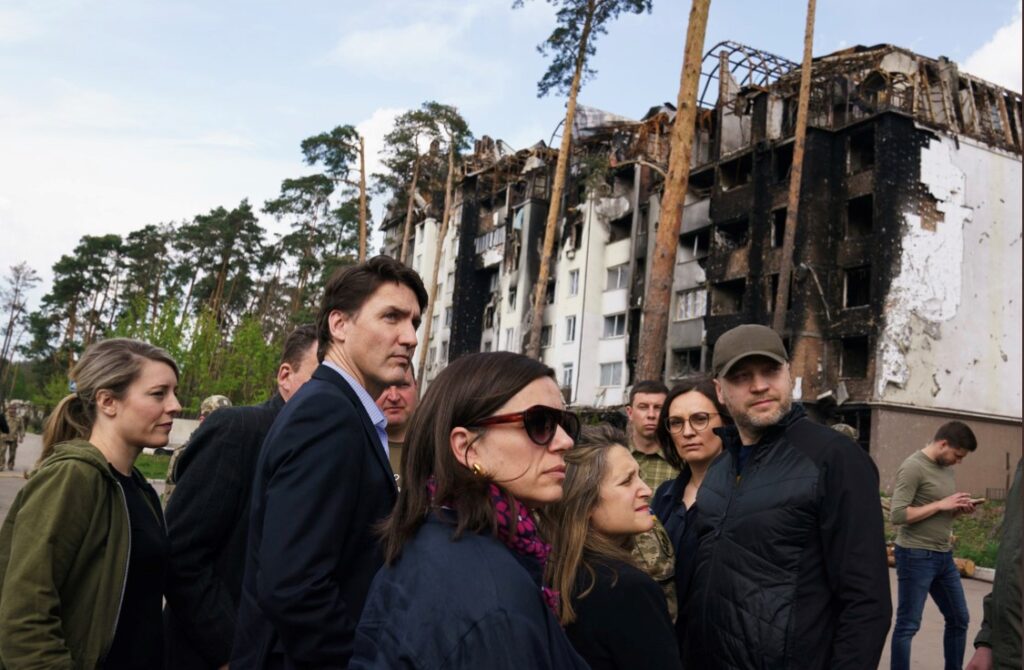
Life in Ukraine
Galadza credits her parents with instilling in her a strong sense of Ukrainian culture from childhood, as well as a fluency in the language. Living in Kyiv gave her a window into the diversity that characterizes the Ukraine of today, a country rich in history, music, art, languages and people. “That rich cultural diversity made me realize that was yet another commonality with Canada—and it’s something most people don’t know about Ukraine,” she says.
Because of her fluency in the language, Galadza was able to interact with people in Ukrainian in shops, in church, at concerts and events. Galadza says people opened up to her in a different way. “I had conversations with several former presidents of Ukraine. Because the conversations could be in Ukrainian, I heard stories, I got their jokes. With one of them I felt like I was sitting across from my grandfather. It was just so warm and comfortable. I could live like a Ukrainian, but of course with all the opportunities that come with being the ambassador of Canada.
“The Ukrainians are a truly remarkable and resilient people who have created a wonderful country and community. I worked alongside a lot of foreign diplomats, and they all said Ukraine was different from anywhere else they had lived. There’s something compelling about it, something all of them would miss. You fall in love with the place and it never leaves you.”
The evolving war
“The war isn’t static,” says Galadza. “Ukraine was at war with Russia when I arrived in 2019. And although we weren’t always seeing daily reminders of the war in Kyiv, it was very important for President Zelenskyy that we didn’t forget that this is a country at war. He made a point to take G7 ambassadors to see war-affected communities close to the front lines. For the leadership in Kyiv, every day is about ensuring people can go about their lives, and also about staying focused on job #1 — winning the war.
“In some areas of Ukraine, furthest away from the front lines, people can live what on the surface looks like a normal existence,” she adds. “But it’s not. Being at war means people have lost their ability to plan for the future. There is a massive diminishment of hope, of control over your destiny. Every Ukrainian is somehow connected to the brutality of the front lines, and Russia can reach any part of Ukraine with its drones and missiles.” Galadza said it has been heartbreaking to watch Russia’s war ravage a people and economy that was so strongly coming into its own. “Education is the next crisis. Between COVID and the war, there are children who are eight or nine years old who don’t know how to read and write. It has always been a highly educated society, one that values education, but in the past few years education has been catastrophically disrupted.”
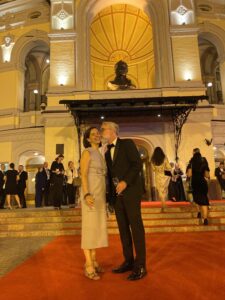
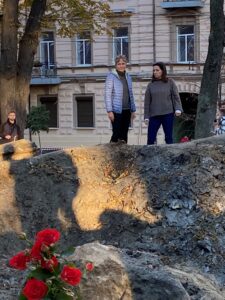
Taking time
Galadza completed her posting on August 1, 2023. She returned to her family in Canada with a distinct lack of a to-do list. “Part of decompressing and reintegrating is just doing nothing for a while,” she says. “There’s a lot to process, not just physically and emotionally, but also intellectually, about what I saw.”
A global shift
The war isn’t just changing Ukraine. The world will never be the same as a result of this war, says Galadza. “The way Zelenskyy is masterfully leading international relations is something to be studied. Overnight, the world realized that Ukraine is an important country, not just a little brother to Russia. We need their economy. We need their innovation. We need their participation on the global stage. Energy security, food security, cyber security, information security, democracy—all these things that give us the space to self-actualize and prosper as individuals and as countries—are being attacked in Ukraine. When Ukraine is attacked, we are also being attacked.
“As Canadians we cannot let up on our attention, our awareness of what’s happening in Ukraine right now,” Galadza continues. “Everyone tires of war. What Zelenskyy understands is that leaders of democracies will go where their people want them to go. This is bigger than anything we can do as individuals, but we need to endorse the idea that our government should continue committing the time, energy and money required to make sure Ukraine wins.
“Ukraine’s victory is our victory. Of democracy. Of freedom. Of the fundamentals of the UN Charter. We can’t give up on that.”
-with Jennifer Matthews
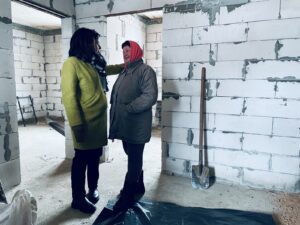
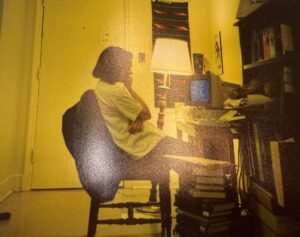
Watch Ambassador Galadza’s farewell video to the Ukraine, July 2023.
As published in the September 2023 Living Trinity Newsletter.

Sorry, comments are closed for this post.